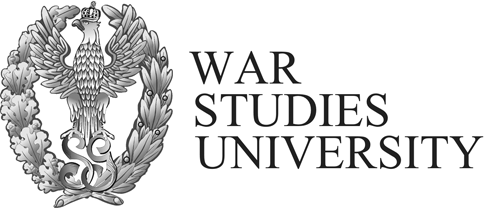Online first
Current issue
All issues
About
Aims and scope
Peer review process
Publication policy and ethics & malpractice statement
Editorial Board
Reviewers
Publisher
Guide for authors
Call for papers
Book Reviews
Special Issues Archive
New and emerging technologies in defence education, training and governance
RESEARCH PAPER
Rules for the transfer of weapons and military technology in the light of contemporary international law
1
War Studies University, Warsaw, Poland
Online publication date: 2016-12-30
Publication date: 2016-12-30
Security and Defence Quarterly 2016;13(4):50-78
KEYWORDS
ABSTRACT
This study investigates the contents of key documents of international rank regulating the
transfer of weapons and military technologies in order to mark the principles that rule this kind
of state activity. The following principles have been pointed out: the principle of minimizing the
consumption of the world’s human and economic resources for armaments; the principle of respect
in the transfers of weapons and the principles of the Charter of the United Nations; the principle
of transparency in the transfer of weapons and military technology; the principle of limitation of
armaments as a factor constituting a threat to peace and national, regional and international
security; the principle of the regulation of transfer of weapons in the domestic law of states; and the
principle of respect for humanitarian law and human rights in international military transfers.
REFERENCES (15)
1.
Th e legal nature of the documents adopted at the CSCE /OSCE is problematic. It is assumed that by the time the functioning of the CSCE as a form of multilateral diplomacy conference was adopted in the framework of its meetings, the documents were of the nature of the international agreements (e.g. Th e Treaty on Conventional Weapons in Europe, the Treaty on the free skies), or non-legally binding political statements (all other documents were not given the rank of an international agreement by the state).
2.
CSCE Forum for Security Cooperation is one of the main decision-making bodies of the CSCE/OSCE brought to life at the Helsinki summit in 1992. Th e Forum has authority on the issue of arms control and disarmament, arms transfers and military technologies, dispute settlement mechanisms, and aspects of political safety. Th is body meets weekly. Th e presidency of the deliberations is given to each of the 56 OSCE participating states for four consecutive months. Decisions are made by consensus.
3.
Th e same idealistic assumptions underlying the post-war European integration of the Western world based on creating close and inseparable economic ties between states and European societies, whose bonds would lead to the creation of joint European political interests, blurring national divisions on the continent and building a federation of states who share common values (democratic model of governance, human rights, respect for the Christian tradition).
4.
See R. Florida, Th e Rise of the Creative Class and How It’s Transforming Work, Leisure, Community and Everyday Life, Basic Books Publishing House 2002, (polish edition: Narodziny klasy kreatywnej, Wydawnictwo Narodowe Centrum Kultury 2010), E. Glaeser, Triumph of the City, Macmillam Publishing House 2011, or B. Barber, If Mayors Ruled the World: Dysfunctional Nations, Rising Cities, Yale University Press 2013 (polish edition: Gdyby burmistrzowie rządzili światem, Wydawnictwo Muza S.A. 2014).
5.
A. Maslow, A Th eory of Human Motivation, Psychological Review, 1943, Vol. 50/4, p. 370–396. doi:10.1037/h0054346.
6.
In the science of international relations, the concept of human security appears increasingly often, which is a manifestation of a broader view of safety, a sign beyond the category of national security. Th e formulation of the concept of human security is a distinction between national security and the safety of its citizens in a situation when the state does not work for their welfare and development. Also, security sciences notice the diversity of types of security depending on the subjects highlighting national security, social security, and security of the state. R. Zięba points on this occasion to unmilitarising, expanding the scope and content of the security (see R. Zieba, O tożsamości nauk o bezpieczeństwie, AON Scientifi c Papers, No. 1 (86) 2012 p. 7 – 22). Th e tendency, in the discussion about security, to go beyond the circle of concepts related closely with the military security of the state appeared in the 1990s with the completion of the global nuclear power rivalry and off set by the wayside threat of war between the great powers and countries allied with them focused on hostile military blocs. Th e world was then faced with new challenges, which could include an increase in the number of armed confl icts of an internal nature, the severity of the new forms of international terrorism, mass migrations, and the deepening economic stratifi cation on a global scale. See on this subject: G. Michałowska, Bezpieczeństwo ludzkie, [in] Świat wobec współczesnych wyzwań i zagrożeń, Symonides J. (ed.), Wydawnictwo Naukowe Scholar, Warsaw 2010, p. 227 – 234.
7.
M. Kaczmarski, Problem proliferacji broni masowego rażenia, [w:] Świat wobec współczesnych wyzwań i zagrożeń, J. Symonides (ed.), Wydawnictwo Naukowe Scholar, Warszawa 2010, p. 375.
8.
Z.J. Pietraś, Podstawy teorii stosunków międzynarodowych, UMCS, Lublin 1986, p. 162.
9.
An example illustrating this phenomenon could be the withdrawal of Spanish troops from Iraq after the terrorist attacks in Madrid carried out on March 11, 2004, with the intention of intimidating Spanish society and discouraging them from continuing to participate in a military coalition with the United States and Great Britain. Th e attacks frightened people going to the parliamentary elections and they elected socialists who campaigned in their election programme for the immediate withdrawal of Spanish troops from Iraq. Th eir election promise has been kept. Th e state decided (indirectly, through the act of election) under the infl uence of intimidation of Spanish society, not guided in this regard, rational indications of the need for participation in the anti-terrorist coalition, in order to create a coherent front against the terrorist threat common to the entire Western World.
10.
Entrepreneurs of special importance for the economy and defence are listed in the ordinance of Council of Ministers dated October 4, 2010 r. (Journal of Laws. 2010. No. 198, item. 1314). Th is regulation lists 200 business entities in the following areas: operation of airports and seaports, radio broadcasting and television production, transport and storage of petroleum products, production, renovation or modernisation of armaments and military equipment, the special trade, transport services, postal services, telecommunications, manufacturing, distribution and transmission of natural gas, liquid fuels and electricity.
11.
In this way, aggression was defi ned by the UN General Assembly Resolution of December 14, 1974 (RES 3314/1974) and by the Statute of the International Criminal Court of July 17, 1998 (Completed by 11 June 11, 2010, just about the defi nition of the crime of aggression on the revision conference in the capital of Uganda – Kampala).
12.
See R. Zięba, Funkcjonowanie paneuropejskiego mechanizmu bezpieczeństwa KBWE/ OBWE, Studia Europejskie nr 3/1998, p. 85.
13.
See FSC.JOUR/314, the material available at the Internet address: http://www.osce. org/fsc/20783.
14.
See www.msz.gov.pl/pl/polityka_zagraniczna/polityka_bezpieczenstwa/kontrola_eksportu/ transparencja/transparencja;jsessionid=36A51C201162AEB978C304DF7244F01F.cmsap1p.
15.
We can also indicate other demands expressing diff erent concepts of justice, “to each according to his works”, “to each according to his merits “,”to each according to his needs”, “to each according to his position”,etc.
CITATIONS (1):
We process personal data collected when visiting the website. The function of obtaining information about users and their behavior is carried out by voluntarily entered information in forms and saving cookies in end devices. Data, including cookies, are used to provide services, improve the user experience and to analyze the traffic in accordance with the Privacy policy. Data are also collected and processed by Google Analytics tool (more).
You can change cookies settings in your browser. Restricted use of cookies in the browser configuration may affect some functionalities of the website.
You can change cookies settings in your browser. Restricted use of cookies in the browser configuration may affect some functionalities of the website.




